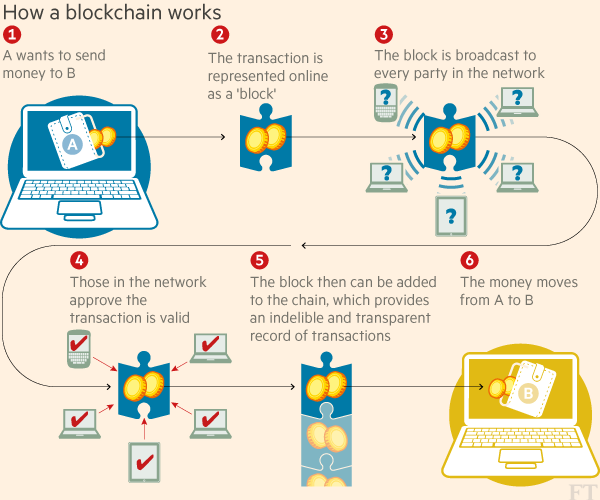Music Industry Is Not Ready For The Blockchain
Although the blockchain technology used for cryptocurrencies such as Bitcoin and Ethereum is often hailed as a potential savior for the music industry, getting the industry to embrace and integrate such technology may, as yet, not be feasible, says Bas Grasmayer.
_________________________
Guest Post by Bas Grasmayer

The blockchain cannot solve the music industry’s problems, before the industry figures out a way to solve them themselves.
Blockchain and its promise
The blockchain is the distributed database model underlying cryptocurrencies like Bitcoin and Ethereum. It takes peer-to-peer technology to data records. Instead of having all data on one computer, it lives on the computers of everyone who participates in the database. You can only write to it: this means that if you want to change data into the database, you declare what the new info is, but the old version remains in the system, so that the change is transparent. A bit like with ledgers.

In short, it gives a certain guarantee of transparency and security, by utilizing decentralized technologies. Every day there are headlines about companies in the banking industry employing blockchain technology. Technologies like this could make the music industry more fair and transparent, and reduce a lot of friction around rights and payments, leaving more money to flow from fan to creator. The biggest obstacle, however, is the music industry itself.
Adopting blockchain
In the week-long Blockchain Labs sessions at Music Tech Fest Berlin, we identified 3 domains for the Blockchain in the (recorded) music business:
- Metadata: the type of data that goes into ID3 tags in MP3s, like who created the song, lyrics, artwork, but also data types that are currently uncommon to find in such tags, like instruments used.
- Rights: who has rights to what and where. Rights can be really complicated in music, and simply adding transparency around this can reduce a lot of friction in licensing, but also in resolving disputes. This would enable smart contracts.
- Payments: the blockchain can function as a ledger, so it could record transfers like payments.
The problem in getting the music industry to adopt the blockchain for anything beyond metadata, is that there are competing interests. For instance, if you’ve invested a lot of money into marketing a sub-licensed work in a certain territory, you wouldn’t want everyone to be able to see when your right expires… because then you’ll have a lot of competitors who might try to secure those rights.
There’s a lot of interest in making payments transparent, so that it becomes clear how much a party like Spotify actually pays to certain labels, and what happens to that money along the chain to the creators. Creators are likely to have privacy concerns about having their income being public though.
Other organisations have a risk of redundancy — although they might secure a new role for themselves by participating.
Moving forward
There are two likely ways in which this can play out:
- The music industry gets together in sessions and makes a real effort to make rights and payments more transparent and more fair, on a global scale. This will be a transparency conversation, not a blockchain conversation.
- A new generation of companies come up and show creators, entrepreneurs and fans that another value chain is possible, that is more rewarding for both artists & listeners. Not only is it more transparent, but it is able to reduce a lot of friction, so that as it scales, it becomes more efficient than the legacy music industry.
Things can change fast. When we refer to the music industry, we’re actually referring to an area of the business dominated by the recording industry, but the recording industry has only acquired this dominance in the last 80 years.
What about the next 80 years?
Written for Bas' weekly newsletter MUSIC x TECH x FUTURE.
I like this idea because it takes the industry and the consumer into an even closer realm that music solely does on it’s own. The transparency technique makes the consumer actually shows their contribution, job, effort as not only as a consumer but as an investor, as an asset, as a contributor. Thus unifying and connecting the WORLD……WOW
METAPHOR: INTERNET, LANGUAGE, MOBILE DEVICES, BUSINESS AND PLEASURE, COMFORTABLE SUIT.
FAMEALY NOT FAMILY
“The music industry” has to be by definition a thin slice of what is the real global realm of music.. The author’s Option #2 above is clearly the optimal path going forward. Bittunes is one Company that has begun to define that space.. http://bittunes.co.uk/the-bittunes-app/
You thinks the printing and the web changed the humanity? So you think Napster, Airbnb and Uber changed the world? These are like B&W pictures or 72dpi resolutions…
Watch out the freakin’out blockchain technology. This will be the supra-disruptive revolution of the human kind.
Everything will be affected: Notaries, lawyers, judges, insurers, banks, finances, pension plans, tenders, retailers, transactions, government taxes, etc. self-supporting organizations, self-managed business (without any profit needed), standalone applications, artificial intelligence.
Everything. For sure YOU first.
Until the Quantum Computing will force us to rebuild the same uncrackable system on a more powerful calculation basis.
Amen.